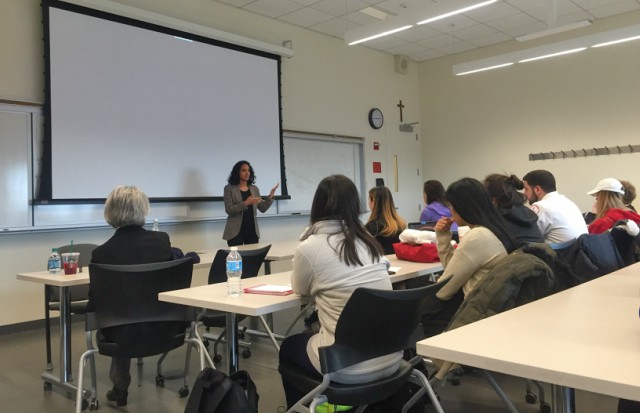The Vincentian Institute for Social Action and Faculty Research presented a “Hot Topics in Social Justice” lecture on opioid addiction moderated by Dr. John Conry, Clinical Professor and Chair of Clinical Health Professions on Nov. 14.
Addiction to drugs, especially opioids, such as oxycontin, percocet, fentanyl and heroin, have been plaguing the U.S. for many years, but in recent years opioid addiction has been classified as an epidemic.
The panel on this topic agreed that this is a widespread issue that requires attention.
“This is a real public health emergency,” Dr. Joanne Carroll, Associate Professor in Pharmaceutical Sciences, said.
Dr. Samantha Jellinek-Cohen, Assistant Clinical Professor in Clinical Health Professions, started the lecture with background literature explaining how opioid addiction pervasively expanded. Dr. Jellinek-Cohen told everyone that pharmaceutical companies saw an opportunity and capitalized on it by providing misinformation with statistics saying that the risk of addiction is less than one percent.
Moreover, she highlighted the aggressive branding Purdue Pharmaceuticals adapted to make oxycontin a “blockbuster drug.” They gave out oxycontin branded items such as hats, stuffed animals, pedometers and CDs, but more nefarious was their use of starter coupons that gave a 10-day supply, which essentially hooked people to opioids for free.
Carroll followed up Jellinek-Cohen with more information on the communities this affects and how widespread opioid addiction is.
“There has been a shift in the view of addiction not as a crime, but as a chronic disease. This is a sad view of our world because when we thought it only affected the inner city and minority populations it was a crime, but now that we know it has affected more rural and affluent white populations it is a disease,” Carroll noted.
Junior Marketing and Advertising major, Akina Nolan said, “it opened my eyes to the racial problem we have regarding drug addiction,” in regard to Dr. Carroll’s comment.
Carroll also went into how the “war on drugs” has failed to create change by saying, “Our response has been a war on drugs, a crackdown, but as we see that has been a failure.”
With the crackdown on drugs being a failure, Dr. Vibhuti Arya, Associate Clinical Professor in Clinical Health Professions, went into how the U.S. should move forward. Arya highlights the necessity for harm reduction rather than criminalization.
“We know that people are going to do it anyway, so the question is how do we reduce the harms that come from it,” Arya, said.
Arya talked about Naloxone, a medication used to block the effects of opioids, especially in overdose, very heavily as a method of harm reduction. She said it can practically “bring people back to life from an opioid overdose.”
All the professors on the panel agreed that research and access to education is very important. “There’s a lot of education and research that needs to be done,” Carroll said, highlighting why it is so tantamount for students to learn this.
Students also left the lecture with that important message.
“As students right now in these programs … it’s important that we know this information,” Maryam Khan, a sixth year Pharmacy major, said. “It’s a lot about educating patients … If we learn this in counseling classes we’re not going to forget this.”








